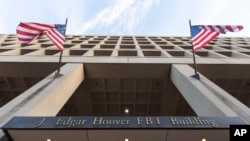The FBI says it is investigating more than 2,000 cases tied to groups designated by the United States as foreign terrorist organizations, a figure that reflects the persistent threat posed by outfits such as al-Qaida and Hezbollah.
There are currently 68 individual groups on the U.S. State Department's list of foreign terrorist organizations, the vast majority jihadi outfits such as al-Qaida. The designation allows the U.S. to freeze the groups' and their members' assets and investigate their activities.
The FBI's renewed focus on foreign terrorist organizations and their members partly reflects the quiet resurgence in recent years of al-Qaida, said Seamus Hughes, deputy director of the Program on Extremism at George Washington University.
"While the primary focus was ISIS the last few years, al-Qaida used that time to bide their time and build up a network," Hughes said. "And so, these cases are still out there, and they're going to have to look at them. It's not just ISIS — there are al-Qaida, its affiliates, and then you have groups like Hezbollah."
Out of about 5,000 terrorism cases under investigation, approximately 850 are focused on domestic terrorism such as far-right violence, while the rest have a nexus to international terrorism, the FBI said in response to a query from Voice of America.
The international terrorism investigations are in turn divided into about 1,000 cases each of so-called homegrown violent extremism and Islamic State. The rest are made up of "thousands of other cases associated with foreign terrorist organizations like al-Qaida and Hezbollah," the FBI said.
FBI Director Christopher Wray first disclosed the top-line number of terrorism cases last October when he testified before the House of Representatives Committee on Homeland Security.
The FBI provided a breakdown of the figure after Wray appeared before the same panel on Wednesday to discuss the threat of international terrorism to the U.S.
The terror threat, he said, has morphed from sophisticated plots directed by foreign terrorist organizations to individual attacks carried out by lone actors inspired by these organizations, Wray said.
"We remain concerned that groups such as the Islamic State of Iraq and ash-Sham (ISIS) and al-Qaida have the intent to carry out large-scale attacks in the U.S.," Wray said in prepared remarks.
While the FBI recently elevated domestic terrorism to a "national threat priority," Wray said homegrown violent extremists, or so-called "lone wolf actors," pose "the greatest, most immediate terrorism threat to the homeland."
"These individuals are FTO-inspired individuals who are in the U.S., have been radicalized primarily in the U.S., and are not receiving individualized direction from FTOs," Wray said, using an initialism for foreign terrorist organizations.
The FBI conducts several types of investigations: a 30-day assessment, a six-month preliminary investigation and a full investigation based on a national security threat or criminal activity. All 5,000 open cases are full investigations, the FBI said.
"The 5,000 is not just the total number of cases they're dealing with," Hughes said. "They're probably dealing with orders of magnitude larger than that."
The FBI did not provide historical data on terrorism investigations, making it difficult to assess the aggregate figure. However, the number in several categories, including homegrown violent extremism and domestic terrorism, has hovered around 1,000 cases in recent years, according to FBI officials.
In the post-9/11 era "they're obligated to open and investigate every plausible threat," said David Gomez, a former FBI special agent and terrorism investigator.
The vast majority of the investigations do not lead to prosecution, Gomez noted, adding that the FBI opens investigations for both intelligence-gathering and prosecution purposes.
The FBI's three largest field offices — in Washington, New York and Los Angeles — are probably responsible for as much as 80% of the investigations, Gomez said.






